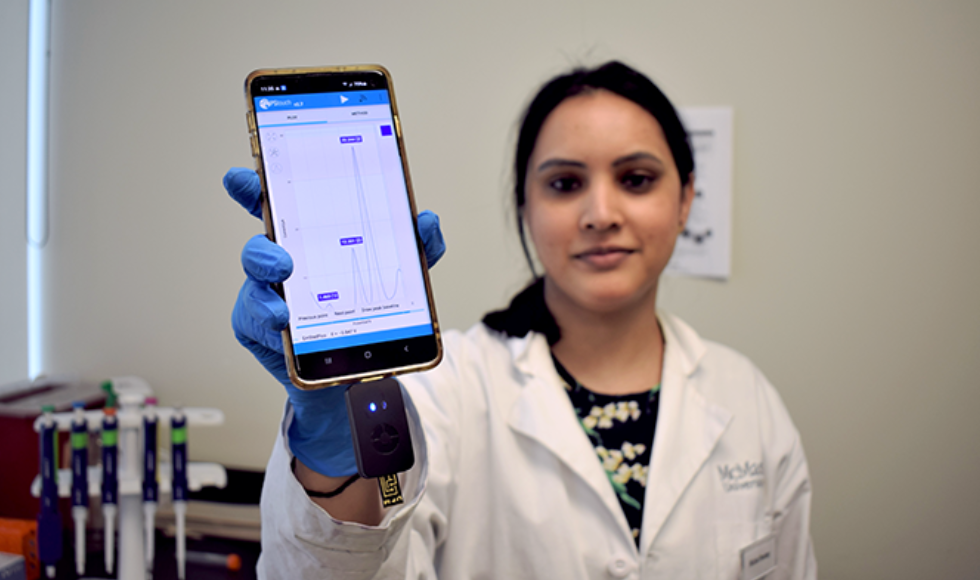Rapid, reliable test for COVID and other infections moves toward marketplace

McMaster researchers who created an accurate, portable diagnostic test have new federal funding to support their work with a company that specializes in developing nanotechnology and health-care solutions.
BY Wade Hemsworth
June 9, 2022
Armed with new government funding and the support of a health-care technology development company, the McMaster researchers behind a new form of rapid, accurate and portable diagnostic test are moving their work toward the marketplace.
McMaster biochemist Yingfu Li and engineer Leyla Soleymani, working with several other academic collaborators and clinician colleagues from McMaster’s faculties of Health Sciences, Science and Engineering, had earlier established that their diagnostic test is effective for identifying COVID-19 and can be readily adapted to detect other forms of infection.
“The pandemic has certainly not been positive,” Soleymani says, “but it has brought together many people to give us a chance to work together on one common goal.”
The aptamer-based test works with a small sample of saliva, which, when added to a chemical reagent, is inserted into a small reader attached to a smartphone, providing accurate results within minutes. This test could be conducted at a doctor’s office or hospital clinic, for example.
The speed and accuracy of the test, once commercialized, could allow testing, diagnosis and prescription all to take place within the same patient visit, which is expected to reduce the spread of infection by confirming without delay who needs to be isolated or treated.
“We want to be able to streamline the process of adapting the technology to other infections so we can react quickly to new threats, whether they are variants of COVID or other forms of infection,” Li said.
“By anticipating the future need for testing we will be able to react much more quickly when specific new threats emerge.”
The potential of the test, which would eliminate the need for time-consuming laboratory work, has led to the team licensing the technology to Zentek Ltd. (“Zentek”), a company specializing in developing nanotechnology and health-care solutions for the prevention, detection, and treatment of illnesses.
Zentek plans to invest more than $1 million in the next five years as it works with McMaster researchers and other partners to scale up production of the test components so they can be manufactured at a commercial level, and to adapt the technology for other forms of infection.
Such collaborations have earned funding by the Natural Sciences and Engineering Research Council of Canada, which is investing nearly $1.5 million in the form of two grants — $1 million to further streamline the technology development in preparation for the next pandemic; and $488,440 (including $140,000 from Zentek) to get the current test to market as quickly as possible — to serve in the ongoing COVID pandemic and also in the detection of other forms of infection.
These activities will be further expanded to include third-party validation of the technology’s effectiveness, Health Canada approvals for COVID-19 and later for other infections, and sourcing the microchips necessary to enable manufacturing.
“The research team at McMaster University has achieved significant milestones for the rapid diagnostic platform, including the creation of a new ‘universal’ aptamer with a high binding affinity to all known COVID variants,” said Zentek CEO Greg Fenton.
“Zentek is proud to continue working with the global-leading research team at McMaster University, with significant financial support from NSERC, which is a great endorsement of our technology and goal of commercialization.”
The research and commercialization efforts are part of Canada’s Global Nexus for Pandemics and Biological Threats at McMaster, which brings together an international network of researchers, government, industry, health care and other partners with the goal of finding solutions to the current pandemic, while preparing for future global health threats such as antimicrobial resistance.


